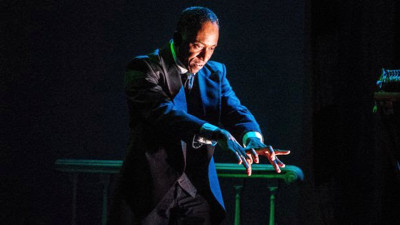
By Barbara Smith
For most people, Scott Joplin is the king of ragtime, an artist whose resurgence in popularity occurred
in 1973 when his composition “The Entertainer” became the theme song for the Oscar-winning “The
Sting” and who was posthumously awarded a Pulitzer Prize in 1975 after “Treemonisha,” his multi-genre
theatrical project which became a precursor to “Porgy and Bess,” was fully staged on Broadway.
But what about man behind the music? “Scott Joplin’s New Rag,” a one-man show, directed by
George Yé, and written and performed by Robert Barry Fleming, at San Diego’s Mo’olelo Theatre, is
an unconventional exploration of this iconoclastic African American innovator, who, against all odds,
became a noted composer/musician/publisher in the Post-Reconstruction South. His history and the
history of art and racism is expressed through spoken word, hip hop, live ragtime music and bursts of
multimedia sensations—headlines, historical recordings, vintage photos and movie clips–projected on a
huge screen framing Fleming, who by turns sings, narrates, ruminates and celebrates. The one constant
is his prolific creative energy, and in this ambitious production, we experience some of the joy and chaos
that inspired one of the most gifted and prolific, yet tormented artists in the American experience.
Born in the late 1860’s in Texarkana, on the border between Texas and Arkansas, Joplin showed musical
talent as a child, and later immersed himself in the emerging musical form known as ragtime. Over his
lifetime, he became the genre’s foremost composer with tunes like “The Entertainer,” “Solace” and “The
Maple Leaf Rag,” which is to this day the biggest-selling ragtime song in history. Despite his public
successes, Joplin was hounded by racist attitudes that took their toll on his psyche. There is reference in
the production to Booker T. Washington’s visit to Teddy Roosevelt’s White House being marred by
racism, and also to the heated dispute between Irving Berlin and Joplin over authorship of
“Treemonisha,” never historically authenticated, but nonetheless a festering wound to Joplin’s soul and
creative spirit.
Fleming channels multiple characters through tone and temperament, including Joplin’s father, who
admonished his son that “the colored man ain’t ever going to get a fair shake from the white man.”
Along with narration lifted from headlines of the era are subliminally planted utterances like “coon,”
“monkey,” “spook” and worse, underscoring the rabid racism that scarred the artist’s prolific and
inexhaustible talent.
Fleming’s own talent is prodigious, from his musicality, playing some of Joplin’s most noted pieces, to
the lyricism of his narration, which at points transmutes into hip hop chaos, mimicking the ambivalent
and chaotic torment of his mind. Fleming skillfully details this agonizing incongruity, even in the balletic
gestures of his hands, in the beginning graceful and fluid and by the end of the play, clenched and
inflexible. In a few instances Fleming’s shift from one character to another needed more definition, and
this may be partly due to the short turnaround time, approximately a week, from rehearsal to
performance. By the end of the run, the show will no doubt take on more fluidity.
A gifted thespian, Fleming has an impressive resume having played on Broadway in “Ragtime” and the
original production of George C. Wolfe’s “Jelly’s Last Jam, ” as well as directing and writing credits with
leading theatres across the country including The Mark Taper Forum, the Guthrie, NYSF/Public Theatre,
the Old Globe and the La Jolla Playhouse. San Diegans may well remember him for his sensitive
direction of Mo’olelo’s critically acclaimed production of “Stick Fly.”
“I wanted to look at African American history and sort it out in a positive way,” Fleming said in a post-
show interview, highlighting the inspiring characteristics of Joplin’s life and work, but also delving into
the tortured times in which he lived. Using hip hop music, for Fleming, was a way “to articulate someone
in a demented phase, a kind of poetic metaphor for his fractured state of mind.” While his inner world
was filled with rage, trauma and sadness, Fleming said, still Joplin’s presentation to the outer world was
careful, down to the meticulously designed clothes he wore, always in an acceptable tradition. Thus,
Joplin’s character emerges as someone who used his work to counter the negative challenges of his life
and bolster his sense of survival.
The Mo’olelo Theatre is at the forefront of theatres in San Diego that produce quality, often cutting
edge drama. Their vision of serving a broader and more diverse audience through the arts is furthered
by this provocative production.



